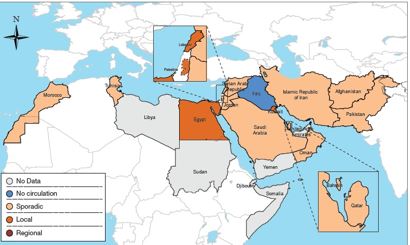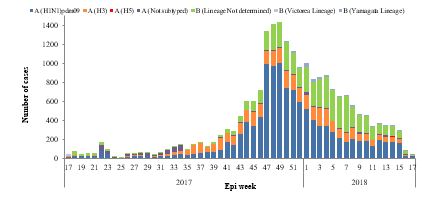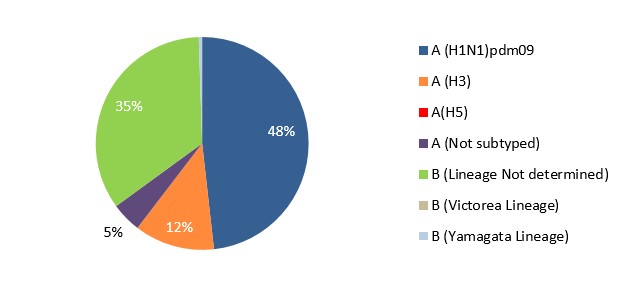In the WHO Eastern Mediterranean Region, influenza activity continued to increase in the month of November in many countries reporting data to FluNet and EMFLU namely, Afghanistan, Bahrain, Egypt, Iran (Islamic Republic of), Iraq, Kuwait, Morocco, Oman, Qatar, Saudi Arabia, Syrian Arab Republic and Tunisia (Fig. 1). All seasonal influenza subtypes were detected in the region.

Fig. 1. Influenza activity in Eastern Mediterranean Region, November 2017
Influenza activity by sub-type
In November 2017, no new cases of influenza A(H5N1) were reported in Egypt.
In the northern Africa influenza transmission zone, Morocco and Tunisia continued to report sporadic influenza A virus detections.
In the western Asia influenza transmission zone, Qatar, Oman and Saudi Arabia continued reporting an increase of circulation of Influenza A and B with predominant detection of influenza A (H1N1) pdm09 viruses. In Bahrain, sporadic influenza cases of A(H1N1)pdm09 and B were reported.
In southern Asia transmission zone, Iran (Islamic Republic of) reported circulation of sporadic cases of the influenza A and B.
Fig. 2 shows the weekly distribution of influenza subtypes.

Fig. 2. Weekly positive cases of influenza by subtype, Epi week 47/2016–2017
Circulating influenza viruses by subtype
During November 2017, regional national influenza centres and influenza laboratories tested a total of 6456 specimens for influenza viruses of which 2138 tested positive (33%).
The average percentage of positivity rates is 17%, with highest positivity rates recorded in Bahrain, Qatar, Oman and Saudi Arabia.
Of the viruses tested, 1743 (81%) were influenza A viruses, including 1282 (60%) influenza A/H1N1pdm09 viruses and 437 (20%) were influenza A/H3 viruses; 395 (19%) were influenza B viruses (Fig. 3).





